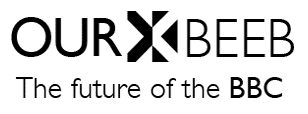Rise to the challenge of public service broadband
by Simon Terrington
I approach this exercise with some trepidation. The BBC is one of the best run organisations in the country. If I was setting out to fix things in the UK, I wouldn’t start with the BBC, or Channel 4, ITV or Sky.
In general, I think our broadcasting system is something to be proud of. There is a risk that this can push us towards a conservative attitude – trying to look after what we have. But it seems to me that that is the opposite of what is required. A lot is changing in broadcasting and these changes require a response.
Every media sector in this country has changed enormously over the last twenty years. All of this change has one simple driver: the enormous expansion in distribution that has been supported by new technology: digital TV, DAB and especially the broadband Internet (fixed and mobile).
The broadcasters have adapted well to the digital TV revolution, investing in platforms and building channel portfolios. The next big challenge is broadband. If digital TV lowers barriers to entry then broadband removes them completely. Broadband also supports a much greater range of devices than digital TV.
Some will say that the problem has been solved. The BBC has developed the iPlayer and there is ITV player, 4oD and Demand 5. These are great innovations but, it seems to me that there is still a way to go. First, the programmes disappear from the iPlayer (and other places). This is not consistent with the way that the rest of the Internet works. It seems natural that the broadcasters will move to a time when their content is permanently available, including material from the archive. This involves significant challenges in both rights and technology, but they are challenges that are worth addressing.
More broadly, the BBC has always combined skills in creative media and engineering. In the early decades, the engineering skills were very important as the technologies were being established. In the 70s and 80s, creative media and storytelling came to the forefront as the technologies were more stable. But now the pendulum has swung back. So it would be good to see the BBC focus its engineering expertise on the great challenges thrown up by broadband.
Since this article asks for one idea, I am going to suggest that the BBC should think about how, in a broadband world, the licence fee is used to support many of the things that we had in the analogue and digital TV spaces: universality of access, reliable continuity of service, user-control of identity and personal data, and no upper limit on consumption of public service media.
Simon Terrington ( @simonterrington ) Chairman of Terrington & Company: a strategy and research firm.
Why vote? We will feed in readers' favourite ideas to the government's consultation on the future of the BBC, and profile them heavily in the media. We believe the debate over the BBC's future is too narrow and focused on cuts - it's missing strong, positive ideas about what public broadcasting can and should be. By voting, you can have your say on what those ideas should be - and if you've got your own, share them with us→




